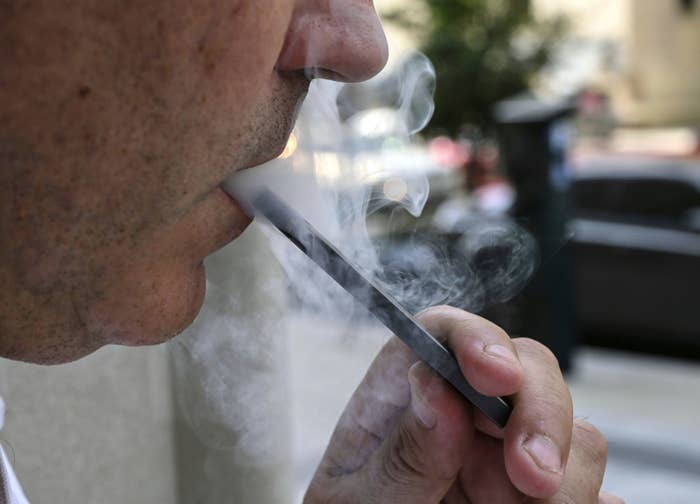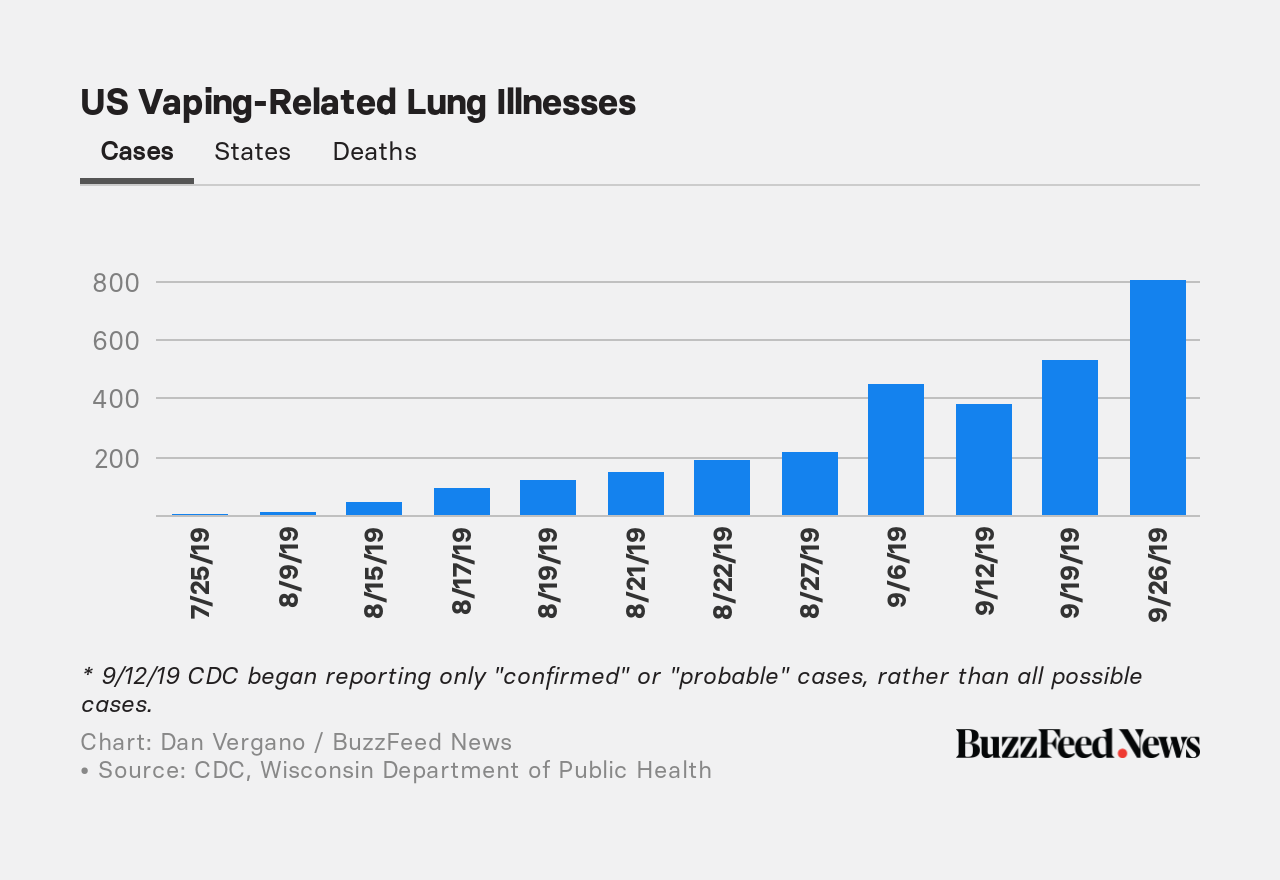
Facing an explosion of vaping-related illnesses — linked to 805 cases and 12 deaths as of Thursday — state officials from coast to coast are banning e-cigarette sales and telling people to stop vaping.
“We are seeing something that we have not seen before,” Charity Dean, acting public health officer of California, said this week in a statewide warning to refrain from vaping altogether.
But critics fear these actions are overreaching. They worry that authorities are failing to distinguish between nicotine e-cigarettes like Juul and vaping devices containing THC, the ingredient responsible for the high from cannabis.
That difference matters, they say, because even though some studies have questioned the safety of vaping nicotine, it’s the latter that has been linked to most of the recent illnesses and deaths.
“There’s a risk in conflating these twin tragedies,” former FDA chief Scott Gottlieb warned in one of several tweets Wednesday. “They each require a very careful and deliberate approach if we’re going to stem these two crises.”
And yanking nicotine e-cigarettes off the market could have health consequences of its own. Ex-smokers who used them to quit may return to tobacco, which smoking experts fear would threaten a decade of progress in reducing smoking rates. Kids now addicted to nicotine because of vaping might turn to cigarettes. Cigarettes are linked to more than 480,000 US deaths yearly; by some estimates, 6.6 million premature deaths could be avoided over the next decade if smokers converted to e-cigarettes.
About to start primary care clinic. Not sure how this #VapeBan is going to work. Of course will try to get everyone to quite #nicotine but suspect a lot of my patients are going to default back to cigarettes which is NOT helpful at all...
While denouncing e-cigarettes as dangerous, Ned Sharpless, the acting FDA commissioner, also expressed worries about the unintended effects of a wholesale vaping ban. “We are also quite concerned about people going back to [tobacco] cigarettes,” he told Congress on Wednesday.
Others think that kids will continue to find ways to vape, even after a ban drives more products to the black market. “I just don’t think kids are going to stop vaping,” said Michael Siegel, a physician and tobacco control researcher at Boston University’s School of Public Health. “I don’t think they’re going to say, ‘There’s no more flavored e-cigarettes, this is over.’”
The move could also drive kids to use more dangerous products, such as bootleg THC cartridges that regulators have little to no way of tracking, Siegel said.
As Gottlieb tweeted, “We can’t ban legal e-cigs and leave the THC and CBD unregulated.”
The CDC’s Anne Schuchat said at the Wednesday congressional hearing that she expected to see the nationwide count of vaping-related lung injuries increase in the weeks ahead. The crisis is pressuring state and federal agencies to crack down quickly.
In response to the growing number of vape-related illnesses starting in August, the CDC warned people — including adult smokers trying to quit — to avoid all e-cigarette products.

While the Trump administration has proposed a nationwide ban on flavored e-cigarettes, many states are moving forward with bans and health advisories of their own. New York and Michigan began enacting bans on flavored e-cigarettes this month, and San Francisco is set to become the first major US city to effectively ban all e-cigarette sales.
On Tuesday, California health officials issued a warning to stop vaping immediately, and Massachusetts took the most aggressive action of all states to date. It declared a public health emergency and placed a four-month ban on all vaping products, including ones used for both tobacco and marijuana.
“The purpose of this public health emergency is to temporarily pause all sales of vaping products so that we can work with our medical experts to identify what is making people sick and how to better regulate these products to protect the health of our residents,” Massachusetts Gov. Charlie Baker said in a statement. Other states, such as Virginia, appear to be close behind.
The CDC does not yet know what specific product, brand, or substance may be causing respiratory illnesses. But it says that “most” patients are known to have used THC-containing devices, while “some” used nicotine-only devices. “Many” used devices with both, according to the agency.
There are key differences in how the two substances are regulated. Juul and other nicotine e-cigarettes will come under FDA regulation in May 2020. Marijuana, on the other hand, is illegal under federal law and therefore not under the FDA’s jurisdiction. A handful of states do allow recreational or medicinal use.
Under this legal patchwork, THC vape cartridges are sold at licensed marijuana dispensaries in states where it is legal, but are widely available on the black market. Many popular brands, like Dank Vapes and Mario Carts, are not actual companies, but rather exist only as colorful packaging that can be bought by anyone and filled with “homebrewed” vape oils. Testing has turned up cheap additives, like vitamin E acetate, in the oils of a lot of cannabis cartridges that have sickened people.
It’s these bootleg devices, not Juuls and the like, that are by and large sending people to the hospital, said Gregory Conley, president of the American Vaping Association, a nonprofit that advocates for vaping legislation and receives funding from e-cigarette manufacturers.
At least four of the 12 known vaping-linked deaths involved THC cartridges, his group notes, citing media reports and health agency press releases. In the cases of the other deaths, what the patients were using hasn’t been publicly disclosed.
Nevertheless, most Americans are holding Juul and nicotine vapes responsible for the outbreak anyway. In a recent Morning Consult poll of 2,200 adults, just one-third said they believed that the lung disease deaths were related to marijuana vapes — but 58% blamed nicotine e-cigarettes.
Some former smokers who have turned to e-cigarettes feel unfairly targeted by the bans. Jeannie Cox of Chattanooga, Tennessee, smoked a couple packs a day for 53 years. In 2013, she heard about e-cigarettes on the radio and decided to give them a shot. “After three days of vaping and not wanting a cigarette, I figured out, well, shoot, I think I just quit smoking,” she recalled. “I didn’t even try.”
For Cox, who hasn’t smoked a cigarette since, a ban would make at least some ex-smokers she knows return to tobacco. As for herself, she said she would find other ways to keep getting or making e-liquids.
“I think they’re overreaching,” the 75-year-old said of the recent state bans. “They’re punishing innocent people for what drug dealers are putting out there.”
That’s not to say that nicotine vapes are safe. In fact, Sharpless of the FDA said that “e-cigarette products are not safe” at the congressional hearing, and added they are also technically illegal, as unapproved medical devices, to sell. His agency sent Juul a warning letter earlier this month over marketing, including among influencers on social media, aimed at minors.
While Juul’s sales pitch has always been about helping people quit smoking, the product has been widely criticized for potentially creating an entirely new population of vape users who were never smokers. To say that their devices are popular would be an understatement: More than 1 in 5 young adults use e-cigarettes regularly. (The company did not return a request for comment from BuzzFeed News.)
At the congressional hearing on Wednesday, Lee Norman, Kansas’s state surgeon, testified in favor of a nationwide ban on e-cigarettes, noting that their health risks are basically unknown at this point and that other ways to quit smoking are available.
The catch: Those other methods do not appear to work very well. A major clinical trial, published in February, showed that people more successfully quit when using e-cigarettes versus other nicotine substitutes, like patches and gums.
“Smokers who switch to vaping dramatically reduce the risk of cancer, heart disease and lung disease that smoking can cause,” study leader Peter Hajek, of Barts and the London School of Medicine and Dentistry, told BuzzFeed News by email. “Banning or over-regulating e-cigarettes protects conventional cigarettes from this much less risky competitor and so it is bad for public health.”
Since the vaping deaths appear connected to THC vaping, Hajek added, bans shouldn’t aim at e-cigarettes intended for people who want to quit smoking.
“This is really a public health disaster, to be honest,” said Siegel of Boston University. “I think that it is a tragedy, frankly, that e-cigarettes are being blamed for a problem that is almost certainly being caused, at least mostly, by marijuana vaping.”

